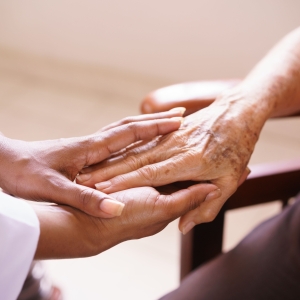New USC Research Highlights the Importance of Health Literacy Among Alzheimer’s Caregivers in Latino Communities
November 21, 2018- Research
Associate Professor Shinyi Wu is on a mission to minimize the burden of care for Alzheimer’s caregivers in Latino communities by identifying and addressing gaps in health literacy.
According to the Population Reference Bureau, the number of Americans age 65 and older is expected to more than double by 2060. What’s more, the Administration on Aging estimates that between 2008 and 2030 the Latino population age 65 years and older will increase by 224 percent—compared to a 65 percent increase for the non-Latino white population.
These demographic changes will present new hurdles in areas ranging from public policy to economics. One of the most pressing challenges will be meeting the health care needs of this aging population. In honor of National Alzheimer's Disease Awareness Month, we spoke with Shinyi Wu, associate professor at the USC Suzanne Dworak-Peck School of Social Work and senior scientist with the USC Edward R. Roybal Institute on Aging, who is conducting research on the disparities in health literacy among caregivers of Latino Alzheimer’s patients.
USC Suzanne Dworak-Peck School of Social Work: How did you become interested in researching new approaches to Alzheimer’s awareness and health care?
Shinyi Wu: I first became interested in studying aging and Alzheimer’s disease when I witnessed firsthand the challenges that my mother faced in caring for my aging father. It became clear to me that the burden of caretaking consists of much more than the physical demands. Those affected by Alzheimer’s often require significant medical, legal, financial, social and emotional attention. I became interested in building integrated systems that better support caretakers and alleviate some of the burden that comes with caring for a person with Alzheimer’s.
USC: What factors may contribute to a higher burden of care for Latino populations dealing with Alzheimer’s disease?
SW: My research has revealed that due to accelerated aging in the United States and a growing Latino population, the number of Latinos living with Alzheimer’s could increase from 379,000 to 3.5 million by 2060—a growth rate of 832 percent. Alzheimer’s is an irreversible chronic condition requiring ongoing treatment and can result in significant financial stress for the family of the patient.
At the same time, Latinos are among the most under-resourced populations in the U.S. when it comes to income, retirement and pension benefits. While Latinos account for the majority of enrollees in safety net health care systems—programs guaranteeing basic coverage for those who are uninsured or fall into low income brackets—these systems often fall short of providing the best possible care for Alzheimer’s patients.
Cultural and language barriers serve to further widen this gap in access to health resources and health literacy among many Latino people in the U.S. In Los Angeles County alone, I was able to identify over 120 support groups for Alzheimer’s and dementia caregivers—yet of those groups, fewer than 10 led meetings in Spanish. These numbers simply don’t add up, since nearly half of the population of Los Angeles County is Hispanic or Latino.
USC: How are you working to identify areas of need among caregivers who work with Latino Alzheimer’s patients?
SW: Often, when a family member takes on the role of caring for a person with Alzheimer’s disease, they lack the knowledge to effectively navigate the multifaceted challenges of care—from identifying health resources and securing financial support to fulfilling their own mental health care needs. Bridging the gaps in access to resources must begin with a more comprehensive assessment of caregivers’ health literacy.
To address this issue, I’m working on a pilot project whose methods involve personal interviews, a survey of caregivers’ behaviors and experiences, and an assessment of video resources available on YouTube that can offer vital support and information to caregivers. The interviews with family member caregivers, health care providers and community-based social service providers point to a pressing need for more Spanish-speaking support groups and general informational resources.
The second part of the pilot consisted of conducting ecological momentary assessments (EMA), in whichcaregivers’ behaviors and experiences are observed in real time. In addition to monitoring activity, these assessments measured emotional reactions and stress via an eight-question survey sent by text message three times per day for one week. Average responses indicated mixed and changing reactions to daily care. While most respondents said they felt happy and satisfied, nearly 35 percent experienced anxiety and more than 21 percent indicated that they felt overwhelmed at certain times.
The third step in the pilot involved analyzing YouTube videos in English and Spanish related to support for Alzheimer's and dementia caregivers. The quality of the video content was assessed based on how well it fulfilled certain caregiver needs—including access to health information, instruction in managing medication dosages, and provision of Alzheimer’s coping strategies.
USC: Ultimately, what do you hope the outcome of this pilot project will be?
SW: Through evidence-based research, we are aiming to develop a deeper understanding of current levels of health literacy among Alzheimer’s caregivers in Latino communities. Our goal is to use our findings to develop solutions that will bridge gaps in access to information and help reduce the burden of care.
Ultimately, I believe that government, community, business, philanthropic and health organizations must work collaboratively to build new educational-based community engagement programs that can arm caregivers and all stakeholders in minority communities with increased health literacy. With a rise in health literacy will come new integrated health care systems that alleviate the multilayered burden of care for Alzheimer’s caregivers—while at the same time promoting better health outcomes for patients.
To reference the work of our faculty online, we ask that you directly quote their work where possible and attribute it to "FACULTY NAME, a professor in the USC Suzanne Dworak-Peck School of Social Work” (LINK: https://dworakpeck.usc.edu)
